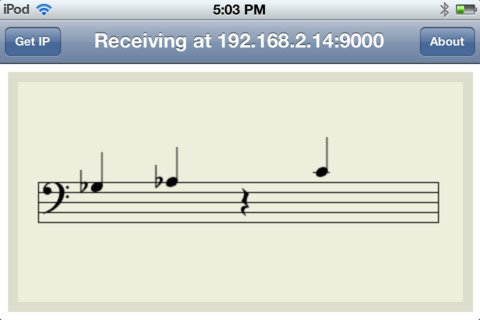In this corner, the computer: dynamic, networked. In this corner, the trained human musician: still, in fact, very much able to read scores. Combining those two technologies – human and machine – has been surprisingly limited.
That’s why OSCNotation, while a very simple app, is an intriguing glimpse into the future of the score. Normally, notation is fixed on paper. Here, you can send musical notes to a performer live, and dynamically – without the use of a printer and dead trees. In fact, with musicians able to sightread, it’s a little bit like being able to send musical patterns to a human in the way that you would over MIDI to a machine or synth. (Ask nicely. Sudo make me a sandwich.)
The app is free and intended for handheld iOS devices. (Hmm, iPad support, please? Although I do rather like the idea of minimal patterns as the focus.)
http://oscnotation.sylvainpoitras.com/
Developer Sylvain Poitras shares his work with CDM, and notes that since rhythm and notes are sent separately, modifying transposition (or rhythmic disposition) is a simple matter. Sylvain suggests some implications of how this would be used on his site:
Live-coders can send patterns and melodies to musicians.
Composers can create pattern based music and use a notation server to send patterns to musician (think of Riley’s In C).
Musicians could use OSCNotation to perform works that require random selection of passages.
There’s a video demo, as well:
I think it suggests some nice possibilities, and I don’t see why centuries of learned notational convention need to be discarded just because we now have computers. Putting the two together could be really powerful.
It’s not a new idea – I recall a Morton Subotnick piece from years ago that used the same concept, though I unfortunately don’t recall the title of that work. (Anyone?) But, of course, ubiquitous mobile computing means what was once confined to big, heavy computers and academic research is now literally in everyone’s hands.
The sorts of people with imaginative thoughts on how to use this tend to read this site, so, I humbly submit to your fancies. Let us know if this inspires you in your own projects.
By the way, notation too boring? The same developer has made an app that combines OSC with the game of Breakout.
